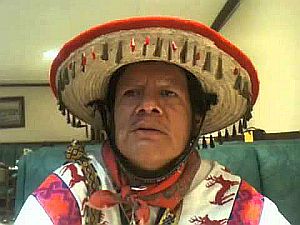Nayarit, Mexico - Braulio Muñoz, president of the Foundation for the Wixárica Defense of Nayarit, said that their sacred place of Tatei Haramara has been sold to two tourist development companies without taking the Wixárica (Huichol) people into consideration.
According to the publication Tijuana Hoy, Mr. Muñoz said that the Government of Nayarit sold almost 25 acres out of the 32 considered by the Wixárica as sacred land.
Tatei Haramara (Isla del Rey) is, in the Huichol cosmology, the ancient sacred place where Mother Water - which gives life to the Wixaritari (plural of Huichol in their language) - is born. Their mythology explains that this is the place where their ancestors came from before moving inland to the desert in their search for the sacred places, creating at the same time the whole universe.
Tatei Haramara, or Isla del Rey, is a small island near the historic port of San Blas. The area is supposed to be protected by the Hauxa Manka Pact that the Huichol people, the Federal Government, and the Governments of Zacatecas, Jalisco, Durango, and Nayarit signed in 2008 for the protection of the Huichol sacred places.
This conflict is the classic one between Modernity and Tradition. Does Mexico, as a country, have the right to develop its territory in ways that it considers most beneficial for its citizens? Or, does it have to respect the ancient traditions of a minority that doesn’t make any profit from their land - blocking in effect what Modernity would call the Progress of the Nation?
It may not seem like a big issue, but it’s something that has happened all over the world with different outcomes. How the United States dealt with the original inhabitants of their territory; how Australia and New Zealand are still dealing with their own indigenous peoples. Brazil right now is struggling with its own indigenous people because of its intention to develope the Amazon.
Just last year the Wixárica people were on a campaign to save Wirikuta, their sacred land in the desert of central Mexico where two Canadian companies got mining concessions from the federal government. The Huichol got huge support from the media, artists, and the public opinion and in the end the government had to declare Wirikuta as a "Mining Reserve" (where no mining is permitted.)
It is a delicate issue, as most people will take the Wixárica side if explained in abstract: "Of course they have the right to their ancient sacred land!" But we all benefit and enjoy the development of Riviera Nayarit as we all live from tourism in the region.
Visitors enjoy the luxury of their big resorts and the natural beauty of our region, while residents are always hoping for more and more tourists, as that means more jobs and a better life. The mining companies would also have created hundreds of jobs and developed an area of the country that is lagging behind. So, it’s not that simple.
Mexico needs to find the perfect balance between progress, development, and respect for the traditions of its indigenous peoples. In this country there are 10 million indigenous people from different ethnic origins, yet there is no indigenous representation in the Mexican Congress.
Maybe the answer is for the different indigenous peoples of Mexico to integrate into the political system and get representation proportionate to their population. That would be around 10 percent of the seats in Congress - that’s how a democratic country should work. Maybe that's the path the Wixárica and all the indigenous peoples of Mexico should follow to protect their interests; it is the same path that every other Mexican has.


